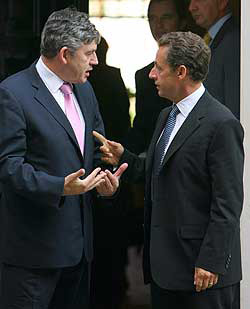 |
 |
 |
 Editorials | May 2007 Editorials | May 2007  
Sarkozy and Brown: New Leaders Will Give Europe a New Dynamic Image Abroad
 Michael Werbowski - PVNN Michael Werbowski - PVNN


| | Then French Interior Minister Nicolas Sarkozy (right) bids farewell to British Finance Minister Gordon Brown after a September meeting in London. (Odd Andersen/AFP) |
Prague, Czech Republic - Last week, new French President Nicolas Sarkozy came to power in France. Across the English Channel, already-anointed leader Gordon Brown is on the verge of entering the prime minister's official residence.

Sarkozy (born in 1955) and Brown (born in 1951) are from the same generation. How these two men steer their countries within the bureaucracies of the European Union and the much larger "European family," including Norway and Switzerland, will likely determine the direction of the continent in the 21st century.

New Transatlantic or Old European Leaders?

France, rationally in the Gaullist tradition, has until now been cautious not to align itself too closely with Washington's global agenda. It is unclear if Sarkozy, like his predecessor Jacques Chirac, will remain aloof from American foreign adventurism or move France closer in tow with the United States. The appointment of Bernard Kouchner, who has publicly supported the American invasion and occupation of Iraq, to the French president's cabinet speaks volumes on this subject.

For its part the United Kingdom, under the stewardship of Brown, may move closer to Europe's "central core" or withdraw the kingdom into itself. This would be an error. In any case it looks like Brown is already distancing himself from Tony Blair's "lapdog" image, as reflected in the outgoing prime minister's servility toward his "big brother" President George W. Bush. Brown may wish to strengthen ties with the Franco-German pairing—a reliable motor that drives the EU forward by seeking closer security and military cooperation and coordination with the EU's common foreign and security policy—in the configuration of a Paris-Berlin-London triad. Brown can also team up with Sarkozy on implementing European-wide measures to curb global warming.

Whatever attitude Brown and Sarkozy take on foreign policy, chances are they will find much more common ground on foreign issues than Blair and Chirac did—on Iraq, for instance. What might be their stance on relations with a "resurgent" Russia? Let's not forget Sarkozy is the son of a Hungarian who was forced to flee the communist takeover of his native land and that Brown will likely pursue closer ties with the "new Europe" at the expense of cozy ties with Moscow.

The Euro's Temptations

Domestically speaking, Brown and Sarkozy may champion the virtues of liberalization of trade within the EU bloc but, due to public pressure, put the breaks on further EU enlargement. In this respect, Turkey will be the EU's odd man out. Sarkozy like Brown also once held the key finance portfolio, although only briefly. How the two men will approach monetary policy within the euro zone is a big mystery. Sarkozy has during his presidential campaign railed against the super strong euro calling for more intervention from Paris in setting interest rate policies in order to loosen the money supply and stimulate growth in France. Such remarks were perceived as electioneering-style meddling and were rebuffed by the European Central Bank.

As for Brown, his attitude toward the euro has many financial shamans and soothsayers scratching their heads. The million-euro question is this: Will Britain dispose of the pound (its most cherished national symbol of post imperial glory) and as have the Germans with the mark and the French with the franc—and thus finally throw in its lot with the common currency's? It does not take an economist of David Ricardo's or Adam Smith's stature and great intellect to figure out that England cannot remain outside the euro zone indefinitely. The issue really is not if but when the Bank of England will be dealing in euros. That time may come under Brown with the former chancellor of the exchequer now on the threshold of assuming power as prime minister.

Furthermore, Sarkozy and Brown are "new Europeans." Their leadership will mark a departure from the old-style haggling, horse trading and bargaining that characterized their predecessors' stance toward the EU. Their attitude toward Brussels is hopefully going to be expressed as "what can I bring to the EU?" instead of "what can I get from it?" Both men are likely to engage with one another and hence converge rather than diverge on European and international issues, as they need each other's support in Brussels to push forward policy goals at home. They are natural partners in that sense on the European scene.
Michael Werbowski is a freelance reporter who specializes in environmental issues. He studied at the University of Leeds, UK and did his MA dissertation topic on EU enlargement to the nations of "new" central Europe. In 2005, he has lectured in Prague's Anglo American college "on corporate ethics and media coverage." As a reporter he covered and commented on issues related to EU and NATO enlargement for the prominent Czech daily "Lidove Noviny" and the "Prague Post." He has written news and commentary for newspapers such "El Excelsior" and "Tiempos del Mundo" in Mexico City. For his environmental coverage of the Chalillo dam controversy in Belize he was awarded an honorable mention for best reporting in 2003 by the Mexican journalists' club.

Mr. Werbowski currently writes for several internet news Web sites among them Worldpress.org, OhMyNews International and UpsidedownWorld.org mainly on environmental topics in Latin America. His articles have appeared translated from English into Spanish and French in magazines and newspapers and Web sites world wide. | 
 | |
 |



